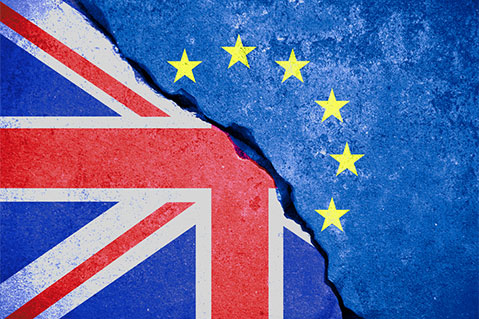June 28, 2016
'Brexit' Decision Sends Economic, Promo Shockwaves
Britain’s decision to leave the European Union has left the country in economic upheaval and has forced its promotional product companies to face an uncertain future. The country’s residents voted in a referendum to leave the EU on June 24, a monumental turn of events that makes the country the very first to exit the 60-year-old bloc.

Voters decided 52% to 48% in favor of quitting the union, a margin of more than one million votes. The decision also threatened the unity of the United Kingdom, as 62% of Scottish citizens voted to remain in the EU.
Britain and much of the rest of the world immediately went into economic shock as a result of the vote. The pound fell to a 31-year record low against the dollar, dropping more than 10% to $1.3199. Stock markets declined across Europe, and the Dow Jones Industrial Average dropped more than 600 points. Lloyds and Barclays, Britain’s largest banks, fell 30% and shares in the Royal Bank of Scotland, at one time the world’s largest bank, dropped 20%. The International Monetary Fund warned that the British economy could sink into recession next year with unemployment rising back above 6%.
Britain’s exit could potentially have major ramifications for the American economy as well, including slowed exports and subsequent delays of interest rate hikes by the Federal Reserve.
Members of Britain’s promotional products industry – which generated £926 million last year – are remaining optimistic despite the country’s rocky economic future. Andy Thorne, sales director of London-based Outstanding Branding (asi/288519), said the company’s growth plans of 50% for this year have not changed. “We have a new marketing manager, a new operations manager, and we are targeting £7,500,000 turnover [revenue], or 1% of the 2008 figure of what the U.K. industry was worth,” Thorne said. “Don’t get me wrong, there are tough times ahead, but we will plan accordingly and execute that plan. We haven’t entered the abyss; we just woke up to a different set of rules.”
Thorne said the company faced similar circumstances when launching seven years ago in the midst of The Great Recession. “We were told we were mad and would fail,” Thorne recalled. Fast forward to 2016: Outstanding Branding turns over £5,000,000 annually, opened offices in New York City and Hong Kong and has become one of the fastest growing companies in the U.K. “It’s irrespective of whether we are in or out of the EU or in a recession or not,” Thorne said. “We have success because of planning, grit, determination and a will to succeed.”
Anxiety about Britain’s economy may be allayed by hopes that business will be better than during the recession nearly a decade ago. “There is little doubt that U.K. companies are apprehensive as to where everything will lead, and it is likely instability will reign until a lot of things become clearer,” said David Long, CEO of Sourcing City, which offers services and hosts networking events for the U.K. promotional merchandise industry. “The U.K. economy is on a much better footing than when the 2008 international economic crash occurred, our banks are stronger, and the Bank of England says they are ready and prepared to provide support where required.”
Jon Birrell, marketing director of the BTC Group, said it’s too early to tell the ramifications of the split, but that the London-based distributor has overcome economic downturns in the past. “We have a multi-sector client base that we believe was one of the reasons why we remained strong through the last recession, while competitors with many ‘eggs’ in financial and automotive ‘baskets’ in particular saw considerable drops in profit and turnover,” Birrell said.
“It will take a while to fully understand Brexit’s impact on each of our clients. We anticipate some clients may be cautious, but that could also lead to other clients grasping the opportunity to promote themselves, ramping up their campaign activity.”
Prime Minister David Cameron led the “Remain” supporters, which included Britain’s Labour Party, Liberal Democrats, the Scottish National Party, Chancellor Angela Merkel of Germany, President Xi Jinping of China and President Barack Obama.
Led by former London Mayor Boris Johnson and Justice Minister Michael Gove, the “Leave” camp includes nearly half the Conservative members of Parliament, the U.K. Independence Party, the French National Front leader Marine Le Pen and other anti-EU parties. “Leave” supporters voted out of the EU because of economic and immigration issues such as funding redistribution and the lack of required visas.
